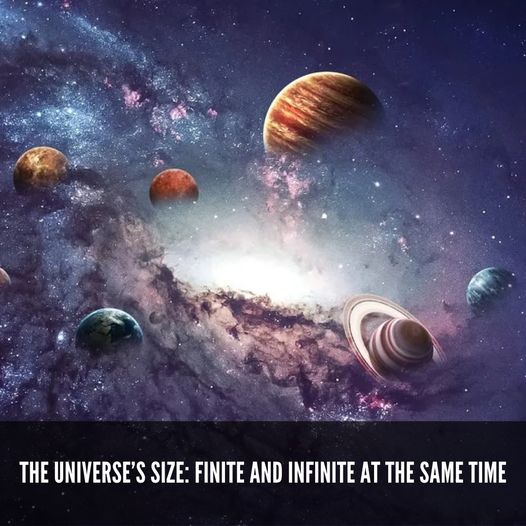
We are all attempting to gauge the vastness of the universe using a single framework, but what if we measure its spatial dimensions using another metric—time?
Let’s consider the universe as “potentially infinite.” I arrived at this conclusion through principles like the “principle of equivalence” and others underlying the “theories of relativity,” including the law of conservation of information.
The crux of the matter is that, much like the matter within it, the universe must exhibit dualism. If particles can exist as both corpuscles and waves, then the universe must be “closed on itself” and “potentially infinite,” experiencing its own time at every moment.
This “dualism” also grants the right for the universe to consist of “entangled particles.”
Regarding the measurement of the universe’s size in terms of time and its “potential infinity,” if this holds true, then in some distant regions, the universe is potentially very young or even unborn, existing at a singularity. Conversely, in other parts of the distant cosmos, it is already old, spanning countless trillions of years.

Theoretically, one could discern the age of the universe in space; some galaxies should appear younger than expected, while others may seem older.
Why do we use “potentially” instead of “infinitely”? Because the universe still has a finite value for its maximum time. In some remote regions of space, there exists a “maximum” duration of its existence.
We can express the “current temporal age of the universe,” not just what we observe from our spatial vantage point. However, we cannot precisely articulate the “entire spatial size of the universe.” Somewhere in it, space loses significance due to the absence of matter, and elsewhere, it becomes meaningless at a singularity point.
At any given moment and any point in its existence, expressing the spatial dimensions of the universe is impossible. Yet, potentially, these dimensions have no boundaries, indicating that the universe is “potentially infinite.”
Regarding “being isolated on oneself,” this concept is more easily understood. The constant here is that if there is something in the universe, the universe essentially exists within that thing.
Following the same logic, the “center of the universe” would be a point with minimal entropy. However, detecting it is not feasible, at least according to the “principle of existence everywhere”—equivalence. In practice, this point would be observed everywhere at any given moment in time, and from any spatial perspective, the universe would appear flat.

Where does the universe have its “own time”?
To address this, let’s pose a few more questions. What constitutes the “real distance” from the center of a black hole to any point outside it? It is deemed infinite, or more accurately, immeasurable. We can only refer to it as “angular distance.”
Now, if we attempt to measure the “real distance” from the center of one black hole to the center of another black hole?
It appears that the value should surpass “infinity,” formally equating to “eternity,” introducing an “additional time vector” into the universe through this means.
Simultaneously, this time vector traverses through us but not through the entire universe, signifying that it does not directly belong to the universe, and hence the universe possesses its “own time.” In this scenario, only we exist in the “difference,” not the universe.
The universe simultaneously encompasses all such vectors, collectively, not individually, and not in their distinctions—unlike our experience. We may also possess the “macroscopic” and “microscopic” arrows of time.
Nevertheless, the universe’s size remains only “potentially infinite” when considering its actual age relative to its “own time.” Unfortunately, the universe’s true age eludes us, and the observed age from our standpoint is not authentic.
In summary, the size of the universe knows no bounds, neither in space nor in future time. From any observational standpoint, the size of the universe in past time will perpetually be inaccurate.
